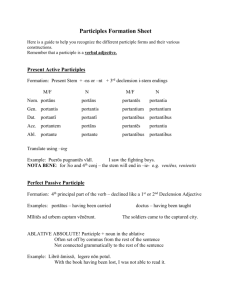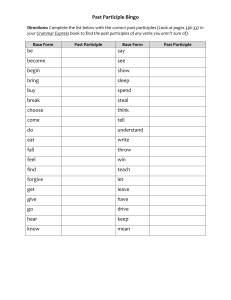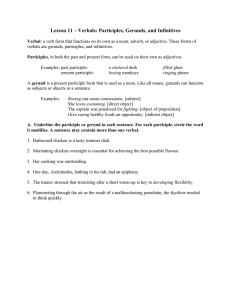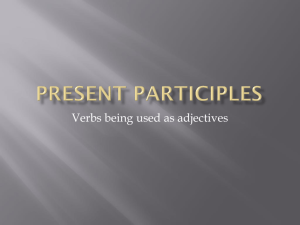Translating into Classical Greek (Teacher instructions) (DOC, 440KB)
advertisement
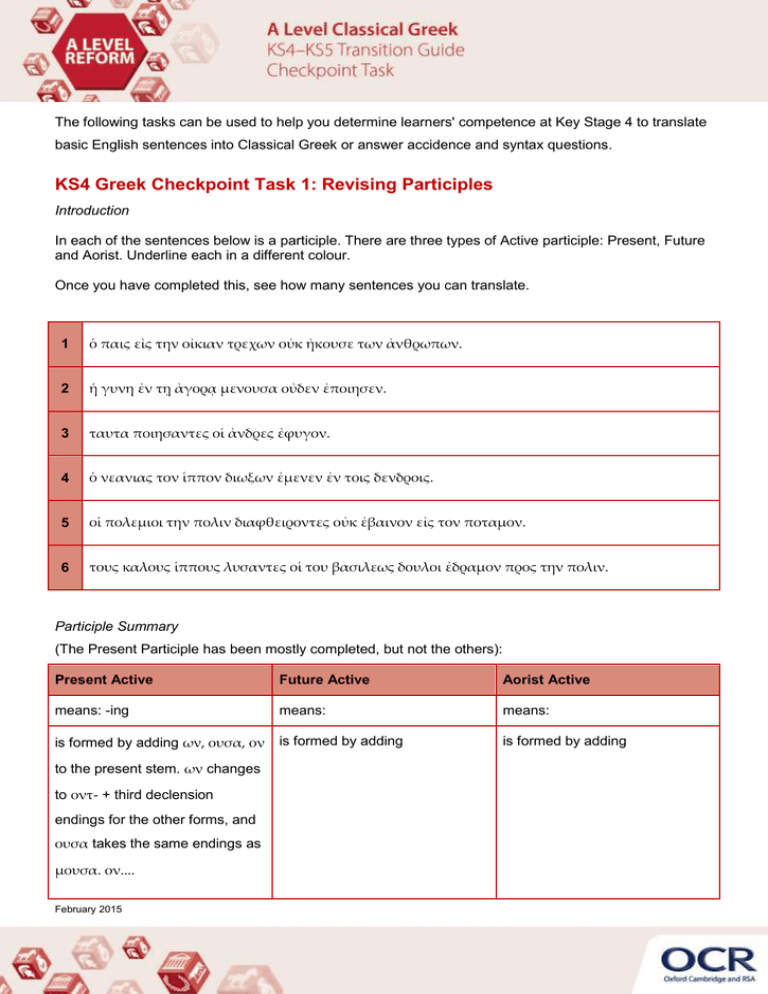
The following tasks can be used to help you determine learners' competence at Key Stage 4 to translate basic English sentences into Classical Greek or answer accidence and syntax questions. KS4 Greek Checkpoint Task 1: Revising Participles Introduction In each of the sentences below is a participle. There are three types of Active participle: Present, Future and Aorist. Underline each in a different colour. Once you have completed this, see how many sentences you can translate. 1 ὁ παις εἰς την οἰκιαν τρεχων οὐκ ἠκουσε των ἀνθρωπων. 2 ἡ γυνη ἐν τῃ ἀγορᾳ μενουσα οὐδεν ἐποιησεν. 3 ταυτα ποιησαντες οἱ ἀνδρες ἐφυγον. 4 ὁ νεανιας τον ἱππον διωξων ἐμενεν ἐν τοις δενδροις. 5 οἱ πολεμιοι την πολιν διαφθειροντες οὐκ ἐβαινον εἰς τον ποταμον. 6 τους καλους ἱππους λυσαντες οἱ του βασιλεως δουλοι ἐδραμον προς την πολιν. Participle Summary (The Present Participle has been mostly completed, but not the others): Present Active Future Active Aorist Active means: -ing means: means: is formed by adding ων, ουσα, ον is formed by adding is formed by adding to the present stem. ων changes to οντ- + third declension endings for the other forms, and ουσα takes the same endings as μουσα. ον.... February 2015 Greek Participles Learning Grid (GCSE) Throw the dice to identify a square. In each square is a participle. You should colour code the participles by their tense. If you are confident with this, then translate each participle as well. 1 2 3 4 5 6 1 τρεχων παυσοντων παυσαντες λυοντες φευγουσιν ἀκουσαντες 2 λαμβανουσιν ἀκουσασαι λειποντες ἀγοντας κλεψαντες πιπτοντων 3 πιστευσοντων φευγοντα ἀκουσοντι ἀξοντες φερουσιν λυσαντων 4 πιστευοντες λεγοντας παιδευσας ἀκουσων βλαπτοντας λυσοντες 5 λυσοντα παυσαντι μανθανοντας λεγοντων διδασκουσιν λεγοντι 6 πιπτοντα μενοντες βαινοντι γραψαντες τρεχοντι λυσασα February 2015 Practising Forming Participles Give the appropriate participle for each of the following in Greek. Remember to check that you are giving the correct Case, Number and Gender, as well as tense. 1 pursuing (Accusative, Plural, Feminine) 2 having released (Nominative, Singular, Masculine) 3 going (Genitive, Singular, Masculine) 4 running (Nominative, Singular, Feminine) 5 having pursued (Dative, Plural, Masculine) 6 about to run (Nominative, Singular, Feminine) 7 about to release (Dative, Singular, Masculine) 8 hoping (Accusative, Plural, Feminine) 9 wanting (Dative, Singular, Feminine) 10 having heard (Genitive, Plural, Masculine) Translation of sentences with Participles Translate the following sentences into Greek. Use the participles in the section above to help you. 1 The man sees the women pursuing the houses. 2 Having released the horses, the boys went to the city. 3 The man saw the slave of the general who was going to the city. 4 Running into the market-place, the woman heard the shouts of the citizens. 5 The woman, about to run towards the house, stopped the boy. February 2015 Summary Briefly summarise how you would recognise each of the participles studied today. Tense Present Active Future Active Aorist (Weak) Active February 2015 Summary of Formation Example
